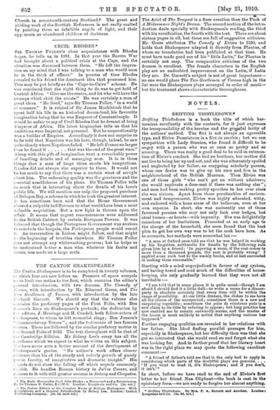THE CAXTON SHAKESPEARE.f The Carton Shakespeare is to be completed
in twenty volumes, f which four are now before us. Pressure of space compels u= to limit our notice to the first, which contains the editor's peneral introduction, with two dramas, The Comedy of E.Tors, with introduction by Mr. Edmund Gosse, and The Ttco Gentlemen of Verona, with introduction by the late
;chard Garnett. We should say that the volume also contains the prefatory pages of the First Folio, with Ben J ausoil:'s lines on Shakespeare's portrait; the dedication by t: :e editors, J. Heminge and H. Condell, both fellow-actors of t...-:cikespe.are, to whom he left memorial rings ; Ben Jonson's Commendatory Verses " ; and the testimonia of less famous writers. These are followed by the similar prefatory matter in I ;o Second Folio of 1632. The text throughout will be that of tile Cambridge Edition. Mr. Sidney Lee's essay has all the c::cellence which we expect in what he writes on this subject. V. -e have never seen a better account of the development of ;Shakespeare's genius. "No author's work offers clearer ev idence than his of the steady and orderly growth of purely r oetic faculty, of imaginative and dramatic insight." His .--quels do not show the falling off which sequels commonly e!;.iibit. He handles Roman history in Julius Caesar, and returns to it with still greater success in Antony and Cleopatra.
The Right Honourable Cecil John Rhodes a Monograph and a Reminiscence. Cy Sir Thomas E. Faller, K.C.M.G. London : Longm_ins and Co. [6s. net.] t The Caxton Edition of the Complete Works of William Shakespeare. With Annotations and a General Introduction by Sidney Lee. London : Caxton Publishing Company. [6s. 6d. each 'rd.]
The Ariel of The Tempest is a finer creation than the Puck of A Midsummer Night's Dream. The second section of the intro- duction deals specially with Shakespeare's reading, the third with his versification, the fourth with the text. There are about sixteen pages in all, but these are full of suggestive criticism. Mr. Gosse attributes The Comedy of Errors to 1590, and holds that Shakespeare adapted it directly from Plautus, of whom no translation had been published at that time. He must have made good use of his " little Latin," for Plautus is certainly not easy. The comparative criticism of the two dramas is excellent. The female characters in the English play are an undoubted improvement on the Latin, if Latin they are. Dr. Garnett's subject is not of great importance— no one would place The Two Gentlemen of Verona high in the list were the Shakespeare plays arranged in order of merit— but his treatment shows characteristic thoroughness.






































 Previous page
Previous page